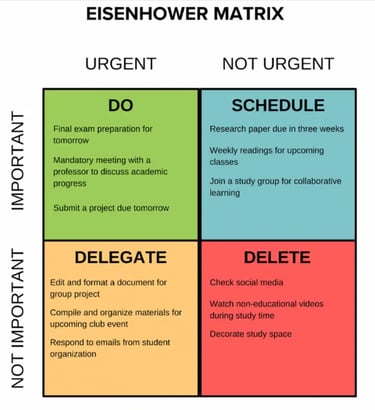Mastering Time: Your Guide to Effective Time Management
Do you sometimes feel there's not enough time, or get stuck in a balancing act? Discover powerful time management strategies that will reduce your stress, increase your productivity, and drive breakthroughs in achieving your goals.
STUDY TIPS
Paul Johnson
4/30/20256 min read


Mastering Time
Do you sometimes feel like there's not enough time? The feeling of being overwhelmed by a packed schedule is quite common and most people would love to squeeze a few extra hours out of the day.
While we can't bend the laws of physics, the good news is you don't need a time-traveling device to feel more in control. The secret? Time management.
Why Time Management Matters
Sometimes life can feel like a constant balancing act, however learning to manage your time effectively can make that balancing act feel less precarious and more rewarding. Here's why it's a game-changer:
Achieving Your Goals: Whether you're aiming for a promotion at work, completing a personal project, learning a new skill, or simply wanting more time for your passions, time management provides the structure to make it happen. By breaking down big goals into smaller, manageable steps and scheduling time to work on them, you'll stay focused and motivated to achieve what's important to you.
Reduced Stress and Improved Well-being: That persistent feeling of being rushed and stressed? Time management can help you minimize it. By planning and prioritizing, you'll feel more in control, have more time for relaxation, hobbies, and connecting with loved ones. Better time management can even contribute to better sleep and overall mental well-being.
Increased Productivity and Efficiency: Ever feel like you're putting in a lot of effort but not seeing the results you want? Effective time management helps you focus your energy on what truly matters, allowing you to accomplish more in less time. This frees up your schedule for the things you truly enjoy.
Improved Focus and Concentration: When you have a plan, you're less likely to feel scattered and overwhelmed. This allows you to focus more intently on the task at hand, leading to better quality work and a greater sense of accomplishment.
Essential Time Management Strategies
Alright, let's get practical. Here are some effective strategies you can start using today to become a time management pro:
Goal Setting (Start with the Big Picture): Think about what you want to achieve in the short-term (this week or month) and the long-term (this year, next five years or longer). You can use the SMART framework to structure your approach:
Specific: The goal must be stated in clearly defined terms.
Measurable: How will you know you've achieved your goal?
Achievable: Is your goal achievable given your current circumstances?
Relevant: Does this goal align with your overall priorities?
Time-bound: Set a deadline for your goal.
Example: "I will dedicate one hour every Saturday morning to working on my art project."
Planning and Scheduling: Use a planner – whether it's a physical notebook, a digital calendar app, or a simple to-do list. Break down large tasks into smaller, more manageable steps with mini-deadlines. Schedule in time for study, personal appointments, hobbies, social activities, and downtime! Be realistic about how long tasks will take and factor in travel time or potential delays.
Time Blocking: Instead of just having "study time" or "personal time," try dedicating specific blocks of time for specific tasks. For example, from 7 pm to 8 pm, you might focus solely on studying history. This helps you concentrate and avoid multitasking, which reduces your efficiency. Find a place you can focus and communicate your need for uninterrupted time to others.
Batching Similar Tasks: Identify tasks you do regularly that are similar and try grouping them together. For example, checking emails, replying to messages, working on homework, or even just packing your bag. This reduces the mental effort of switching between different types of tasks and saves a lot of mental energy and time.
Dealing with Procrastination: We all procrastinates sometimes. Some reasons include feeling overwhelmed, fear of failure, or lack of clarity. Some useful strategies include:
Breaking it down: Breaking down a large task into smaller, bite-sized pieces makes it more manageable and less intimidating. Tackle just the very first step of the task. Often, getting started is the biggest hurdle.
Starting with the easiest part: Identify the smallest, simplest, or most appealing sub-task within the larger task. This requires minimal mental energy and provides a quick win, boosting your confidence. Completing this easy task creates a sense of progress and builds momentum, making it easier to keep going while raising your productivity.
Using the Pomodoro Technique: The Pomodoro Technique is a time management method where you work in focused intervals (e.g., 25 minutes) followed by short breaks (e.g., 5 minutes). The short, timed intervals encourage focused work and help you resist distractions and stay on track because you know a break is coming soon. Also, by breaking work into manageable chunks of time, even the largest of tasks will feel less overwhelming.
Rewarding yourself: Acknowledge and celebrate completing challenging tasks to stay motivated. Rewarding yourself will provide extra motivation to start and complete tasks and reinforce the positive behavior of doing the task, helping you overcome procrastination.
By associating completing tasks with positive feelings, you'll gradually build a more positive attitude towards tasks you might have previously avoided.
Minimizing Distractions: In today's world, distractions are everywhere. It's important to identify your biggest time-wasters (e.g. social media, notifications, and unchecked recreation) then implement strategies to minimize them. Some tips include:
Turning off notifications: Silence those pings and alerts when you need to concentrate.
Finding a dedicated study space: Whether it's a home study, a quiet corner, or a library, find a space where you can focus uninterruptedly when studying.
Use website blockers and focus apps: If you find yourself constantly drawn to distracting websites or apps, consider using tools to block them during focused study periods.
Tools and Resources
There's a wide selection of time management tools and resources. Some of the most useful include:
Planners and Calendars: Choose a system that suits your preferences, whether it's a traditional paper planner or digital apps like Google Calendar, Outlook Calendar, or various scheduling apps. Look for features like reminders, color-coding, and recurring event options.
To-Do List Apps: Apps like Todoist, Trello, Asana, and Microsoft To Do help you organize tasks, set deadlines, prioritize, and even collaborate with others. Many offer features like reminders, priority levels, and sub-task management.
Focus Apps and Website Blockers: Apps like Forest, Freedom, and Cold Turkey can help you stay on track by blocking distracting websites and apps for designated periods. Some offer gamified elements to make staying focused more engaging.
Productivity Techniques: Explore various productivity methods like the Getting Things Done (GTD) system or timeboxing to find approaches that resonate with your style of doing things.
Making Time Management a Habit
Developing strong time management skills takes practice and patience. Here's how to make it a lasting habit:
Start Small and Be Consistent: Don't try to implement all these strategies at once. Choose one or two that appeal to you and focus on using them consistently. You can add more once you've implemented these.
Be Flexible and Adapt: Life is unpredictable so don't get discouraged if your plans get derailed. Learn to adjust your schedule and reprioritize as needed.
Review and Reflect: Regularly take a few moments to assess what's working well and what isn't. Are you consistently missing deadlines or feeling more stressed? Adjust your strategies based on your experiences.
Be Patient and Kind to Yourself: You won't become perfect at time management overnight. There will be days when you struggle so don't be too hard on yourself. Just learn from it and keep practicing.
Conclusion
Mastering time management is a valuable skill that will benefit you in all aspects of your life, from managing daily tasks to achieving long-term goals. By implementing these strategies and finding the tools that work best for you, you'll take control of your day, be more at peace, and have more time for the things that truly matter. Start Now! Feel free to experiment with these techniques and gain full control over your time!
References
"Eisenhower Matrix", (2025). Eisenhower Matrix Examples for Students. Available at: Eisenhower Matrix for Students: 5 Practical Examples (productivitypatrol.com). (Accessed 23/04/2025).
"Mastering time", (2017). Flat Lay Photography of Unfold Book Beside Macbook. Available at: Flat Lay Photography of Unfold Book Beside Macbook · Free Stock Photo (pexels.com). (Accessed: 23/04/2025).
SMART framework. SMART Goals. Available at: SMART Goal - Definition, Guide, and Importance of Goal Setting (corporatefinanceinstitute.com). (Accessed: 24/04/2025).
Eisenhower Matrix. Eisenhower Matrix | Task Prioritization Method to Increase Productivity. Available at: Eisenhower Matrix | Task Prioritization Method to Increase Productivity | GeeksforGeeks. (Accessed: 24/04/2025).
Pomodoro Technique. What Is the Pomodoro Technique? Available at: Pomodoro Technique: History, Steps, Benefits, and Drawbacks (verywellmind.com). (Accessed: 24/04/2025).
Prioritization: It is important to prioritize the most important or urgent tasks to use your time and energy effectively and avoid being sidetracked by time-wasting activities. The Eisenhower Matrix is a helpful tool for categorizing tasks in order of importance:
Urgent & Important (Do Now): These are your top priorities.
Important but Not Urgent (Schedule It): These contribute to your long-term goals.
Urgent but Not Important (Delegate It): Can someone else handle this?
Not Urgent & Not Important (Eliminate It): These are time-wasters that don't contribute to your goals.


"Eisenhower Matrix", (2025)
"Mastering time", (2017)
© 2025. All rights reserved.
